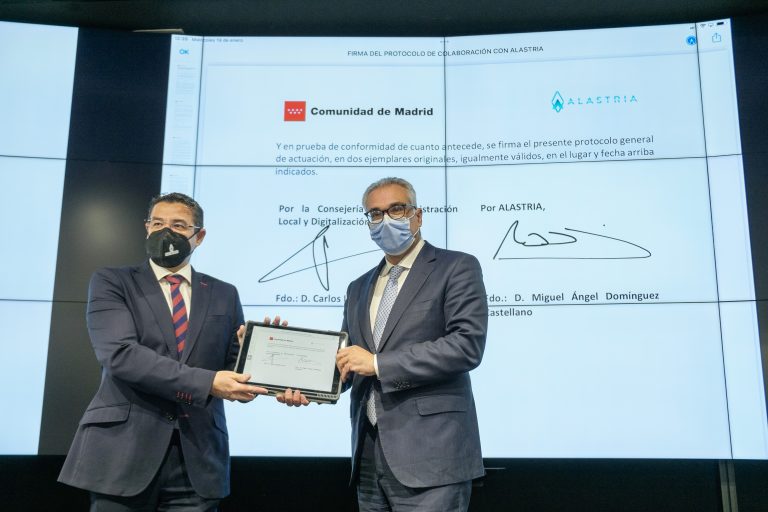- The agreement will give Madrid’s regional government the guidance it needs to set up its own node in Alastria’s blockchain networks.
Madrid, 19 January 2022.- The Community of Madrid today signed a collaboration protocol with Alastria to implement blockchain in its digital transformation process, thus joining a trusted environment to exchange data and transmit information more transparently, dynamically and easily.
Minister for Local Government and Digitalisation, Carlos Izquierdo, and Alastria’s president, Miguel Ángel Domínguez, signed the agreement at the Conecta Lab facilities at the Universidad Pontificia Comillas, “with which Madrid joins this vast network of more than 500 members, including public and private organisations and individual experts, who are working to promote the development of this technology in Spain”, the minister said.
For his part, Izquierdo said: “Blockchain has great potential when it comes to protecting the digital services provided within the ministries’ administrative processes, thus securing the service provided to citizens. Functioning as a giant database, this technology could therefore be used to log assets such as academic qualifications, certifications or files.”
The agreement includes the possibility of the Community of Madrid receiving the advice it needs to set up its own node in Alastria’s blockchain networks. It also provides for the implementation of joint actions to disseminate this technology at congresses, seminars, conferences, workshops and other specific events.
The minister assured that this technology will also “provide citizens with a digital identity that allows them to own their data and decide what they want to share, when and with whom”.
For his part, Domínguez said: “Alastria has solid strengths and capabilities to support the Community of Madrid in its digital transformation initiatives, thanks to a multi-sector ecosystem with expertise in blockchain, a digital identity model considered a benchmark in Spain and the rest of Europe, and a blockchain infrastructure in several technologies for experimentation and project deployment. We are making this experience available to the Community of Madrid to boost the region’s blockchain cluster in the short term”.
By way of conclusion, Izquierdo said: “Madrid is a leader in the digital arena. Ours is the region with the most fibre optics in all of Spain: 98% of homes have a fibre optic connection, compared to 80.5% in all others, and 4G reaches 100% of the population and 100% of metro stations. This quality of digital infrastructures means that we are also the region with the highest concentration of companies in the ICT sector, accounting for 64% of all investment in this industry.”
Mariano Ventosa Rodríguez, vice-rector for Research and Teaching Staff at Universidad Pontificia Comillas, also took part in the ceremony to welcome the signees. He thanked Alastria and the Community of Madrid for having chosen the university to sign this agreement and assured that “advancing in technologies such as blockchain is essential for the challenges we face”.
